Filter
3.4.7.1 - ADLink Driver, Software
including Archiv
PC Add-On Cards, Panels, Accessories, and Driver Software from ADLink are the perfect solution for customizing your PC setup. With ADLink's driver software, you can easily install and configure add-on cards, panels, and other accessories to customize your PC. ADLink's driver software is simple to use and ensures that your PC is optimized for the best performance. With ADLink's driver software, you can ensure that your PC is running at its best.
| 3.4.7.1 | PCIS-ISG/R | IsaGRAF runtime license driver for ADLink PCI Cards | call | |
| 3.4.7.1 | PCIS-ISG | IsaGRAF driver for ADLink PCI Cards | call | |
| 3.4.7.1 | PCIS-ICL/R | InControl runtime license interface for ADLink PCI Cards | call | |
| 3.4.7.1 | PCIS-ICL | InControl interface for ADLink PCI Cards | call | |
| 3.4.7.1 | DasyLAB/ADLink | DasyLAB driver package for ADLink Cards | call | |
| 3.4.7.1 | DAQBench/R | ActiveX controls for ADLink Cards, runtime | phased out | |
| 3.4.7.1 | DAQBench | ActiveX controls for ADLink Cards | phased out | |
| 3.4.7.1 | PCIS-DASK/X | Linux driver for ADLink PCI Cards | incl. | |
| 3.4.7.1 | MAPS-Core | DAQ software & utility all-in-one core package | incl. | |
| 3.4.7.1 | ACLS-LView | LabView driver for multi functions Cards | incl. | |
| 3.4.7.1 | ACLS-DLL2/R | Run time license ACLS-DLL2 | incl. | |
| 3.4.7.1 | ACLS-DLL2 | Windows 3.x DLL driver for AD, DA ACL-Cards | incl. | |
| 3.4.7.1 | ACLS-DLL1/R | Run time license for ACLS-DLL1 | incl. | |
| 3.4.7.1 | ACLS-DLL1 | Windows 3.x, 95/98, NT DLL driver for DIO for ACL-Cards | incl. | |
| 3.4.7.1 | PCIS-DDE | DDE server for ADLink PCI Cards | call | |
| 3.4.7.1 | PCIS-VEE | HP VEE driver for ADLink PCI Cards (included) | call | |
| 3.4.7.1 | HSL-OPC | OPC driver for ADLink HSL distributed IO systems | phased out | |
| 3.4.7.1 | PCIS-OPC/R | OPC driver runtime version for ADLink Cards | call | |
| 3.4.7.1 | PCIS-OPC | OPC driver for ADLink Cards | call | |
| 3.4.7.1 | PCIS-OCX | OCX driver for ADLink Cards | call | |
| 3.4.7.1 | DAQView | Data acquisition system creator for ADLink Cards | phased out | |
| 3.4.7.1 | DAQ-MTLB | MatLab driver for ADLink Cards | phased out | |
| 3.4.7.1 | AD-Logger | ADlink configuration-based Data Logger | phased out | |
| 3.4.7.1 | ADL-GPIB | GPIB tools driver for ADLink GPIB Cards | incl. | |
| 3.4.7.1 | PCIS-LView/2000/NT/98/95 | LabView driver for ADLink PCI Cards | incl. | |
| 3.4.7.1 | WD-DASK | Windows driver API for PCI/PXI-9820 and PXI-98xx Digitizer | incl. | |
| 3.4.7.1 | D2K-DASK | Windows driver & SDK for DAQ/DAQe/PXI-2000 Series Cards | incl. | |
| 3.4.7.1 | PCIS-DASK | Windows driver & SDK for ADLINK PCI/PCIe/cPCI DAQ Cards | incl. | |
| 3.4.7.1 | DAQPilot | Task-oriented DAQ Driver and SDK for ADLINK Cards | incl. | |
| 3.4.7.1 | DAQMaster | Configuration-based device manager for ADLINK Cards | incl. |
There are no categories here at the moment.
acceed news
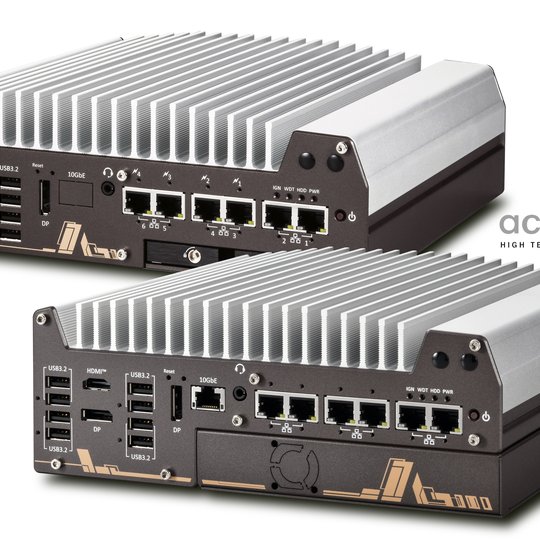
With the growing demand for networked production, real-time data processing and decentralised intelligence in industrial environments, the requirements for embedded computers have changed significantly in recent years. Today, it is not just computing power that counts – energy efficiency, communication diversity and the ability to integrate into AI-supported processes are also key factors. The new Nuvo-11000 IPC series addresses precisely these requirements, positioning itself as a robust and scalable platform for industrial edge computing applications. All variants of the new series are now available with individual configurations from the German distributor Acceed.
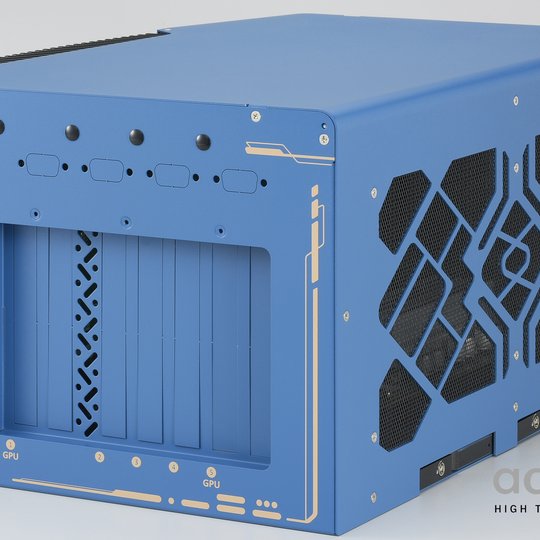
Industrial automation has been undergoing change for some time now. While previous production systems relied on classic PLC and IPC architectures, the era of Industry 5.0 increasingly demands modular, AI-enabled platforms that not only perform control tasks but also enable data-intensive analyses and machine learning. With the Nuvo-10000GC, German distributor Acceed is introducing a new generation of industrial computer systems that meet precisely these requirements for edge AI applications – compact, powerful, expandable and robust.
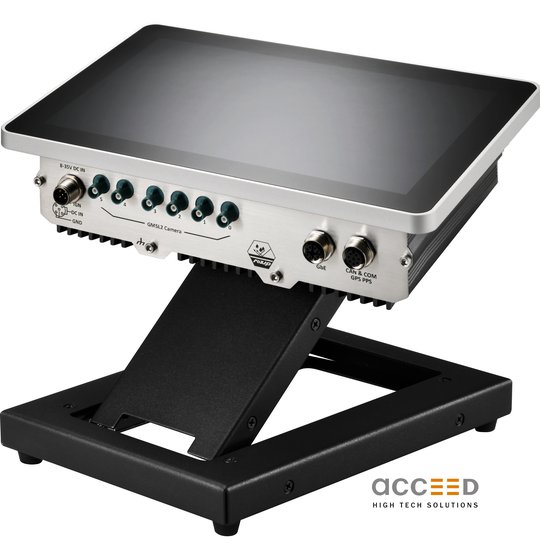
Decentralised data processing plays an important role in the ongoing growth of digitalisation and automation in industry. Edge computing is becoming a key technological consideration, particularly when low latency, minimal downtime and high security standards are required. At the same time, there is a growing demand for high-performance artificial intelligence (AI) directly on the production line – without having to go via the cloud. This is exactly where the new NRU-170PPC panel PC from German distributor Acceed comes in: an industrial AI edge computer with an integrated screen that is designed for continuous operation under demanding conditions and sets new standards in computing power, robustness and system integration.
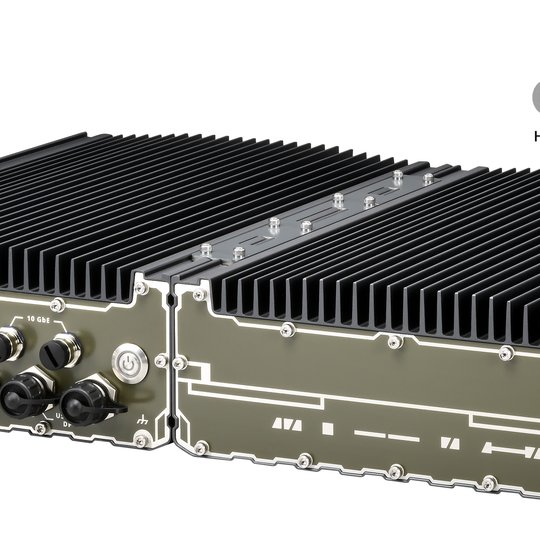
Resilient, fanless, GPU-accelerated: these are the requirements for AI-focused computers on the production line, in development, in the field and under extreme conditions. Or deep learning, object recognition and video analysis brought directly to the road, robust, compact and independent of the cloud. To meet these challenges, the new SEMIL-2000GC combines the uncompromising robustness of a fully enclosed IP67 industrial system with the computing power of the latest Nvidia RTX GPUs – ideal for demanding applications in the fields of autonomous driving, industrial image processing, mobile robotics, smart cities, surveillance or edge AI in IIoT. Certified according to EN 50155, the controller can also be used in rail vehicles and in an extended temperature range from -40 to +70 °C.
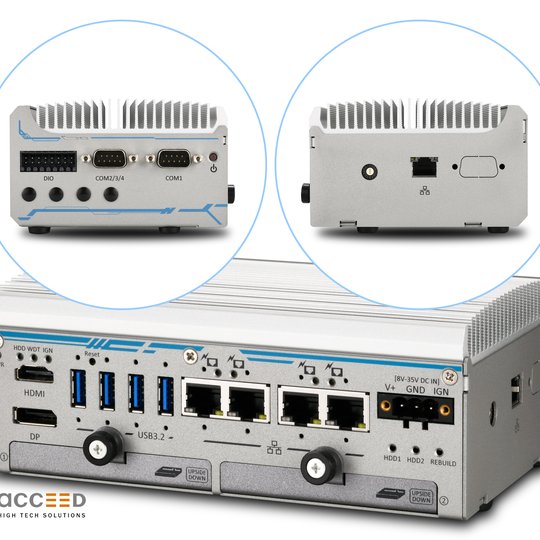
Acceed is expanding its range of industrial box controllers with the fanless compact computer POC-764VR, which has been specially developed for video analysis and object recognition. In addition to the robust design tailored to industrial applications, the new controller impresses with its reliable high computing power and offers HD image recording, real-time detection and data analysis with support for various sensors. The possibility of remote access improves safety and efficiency and reduces operating costs.
